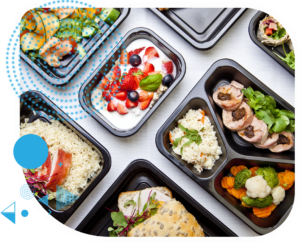Business Energy For Catering
 It’s essential for businesses in the catering industry to monitor their energy bills and implement ways to reduce operating costs. Catering companies tend to have very high energy bills, partly because they use multiple electrical appliances during the course of the day.
It’s essential for businesses in the catering industry to monitor their energy bills and implement ways to reduce operating costs. Catering companies tend to have very high energy bills, partly because they use multiple electrical appliances during the course of the day.
GO TO . . .

Comparing different energy deals can save catering business owners significant money.


How Much Electricity Does A Catering Company Use?

A catering company uses a lot of electricity, with modern-day restaurants in the catering industry using as much as ten times more electricity than a home does. This is because a restaurant’s appliances and cookers use a significant amount of power – even if the kitchen itself is not big – and it can end up costing thousands of pounds to run.
Different appliances that you will find in a catering company kitchen include:
Refrigerators
Walk-in freezers and coolers for storage of meat, fish, vegetables, etc.
Commercial ovens including grilles, toasters, rotisseries, fry, etc.
Commercial dishwashers and pot washers
Mixers, blenders, whipped cream makers, microwaves etc.
It’s fair to say that your electricity usage will be significant if you run a catering company. The good news is that there are several different ways of reducing it – and not all of them cost any more additional money.
Which Energy Deals Are Available To Restaurants?
Restaurants consume a lot of energy, and running costs can be very high. Business electricity deals are available to every business, and catering companies benefit from special rates.

Different energy providers offer a range of tariffs designed for commercial use. Many provide a choice of fixed prices or variable, with the latter being more suitable for businesses that have high levels of usage throughout the year.
Energy prices may also sometimes include network costs, service fees, fees for early termination, etc. It’s important to check exactly what you’ll be paying for and when.
Restaurants are also able to benefit from power purchase agreements (PPAs). PPAs are essentially contracts between a company and an electricity generator or supplier, with the former agreeing to buy electricity at an agreed price for a number of years. This can save catering business owners money on their energy bills as the cost of electricity is easier to predict.
Another factor that can help businesses save money is the Climate Change Levy (CCL). If businesses use under a specific amount of electricity, every day they will not be subject to the CCL.
These savings can be significant, but it’s important for catering company owners to remember that if their business changes in size or use there could be implications. That’s why buying power contracts should always be done with specific business plans in mind. It’s always good to be flexible, but any contract should last long enough for your business plans to reach fruition.
How Can Restaurants Save Money On Energy Bills?
It’s essential to have a plan of action when dealing with your business energy bills.

Here are some energy-saving tips:

Switch appliances off
When they are not in use, you should switch off restaurant appliances. Switching off energy-guzzling devices when you are not using them is one of the easiest ways to save money on bills. It seems simple, but you would be surprised at how many people leave appliances, such as dishwashers and microwaves, plugged in when not being used.
Make sure you check whether your appliances have a stand-by function; if so, make sure to switch this off. Unplug your appliances at night or whenever you go home for lunch. This simple technique results in energy savings without any extra effort or cost. Apart from substantial savings, they can also increase energy efficiency.
Keep appliances maintained
Appliance maintenance is crucial for saving money on bills. Regular checks by a professional could save as much as £100 a year per appliance. For example, if an oven is not maintaining its required temperature, it will need to work harder, increasing energy consumption by up to 40% and improving energy efficiency.
You should check the seals on ovens and fridges regularly. If your fridge isn’t cold enough, you’re not only wasting money but also risking food safety. Also, make sure to top up any lost refrigerant gas at the appropriate time (normally every three years).
Use the right equipment for the job
Energy efficiency is an essential aspect of running your business efficiently and will save you money on bills. For example, if you are cooking large batches of food, use a convection oven. It uses less energy to roast the same volume of food as a conventional oven would.
Look for equipment with an ‘A’ rating or higher on the Energy Saving Trust’s list of most energy-efficient products – your equipment choices will have an impact on your carbon footprint. Additionally, using induction hobs uses less energy than conventional gas or electric hobs.
It’s also a good idea to look for equipment that maximises energy efficiency by choosing the most suitable size for your cooking needs. For example, you can heat washing-up water in a pan on a hob instead of an energy-intensive dishwasher. Changes like these will help you save energy and cut costs.
Switch to energy-efficient light bulbs
Your lighting is responsible for around 20% of your annual energy consumption. Installing low-energy light bulbs will reduce this by as much as 80%. Not only do LED lights use on average 88% less energy than traditional filament light bulbs, but they also last on average 12 times longer.
Additionally, LEDs can add a modern twist to the aesthetics of the restaurant. You can use lighter shades of LEDs in light fittings, with the option to dim these. This will help create a more cosy atmosphere while being energy efficient.
You should also consider integrating your lighting with the building’s automation system. This will increase convenience to the customer and reduce energy consumption.
Don’t keep the fridge in a hot area
Keeping your fridge in a hot area, such as the kitchen, will work harder to maintain its required temperature, increasing energy consumption. Keep the fridge away from heat sources and other appliances to reduce this effect. This will also ensure your food is not at risk of spoiling.
Consider placing your fridge on a stand. This will ensure the required ventilation space underneath is provided, allowing cool air to circulate the fridge. If you cannot place it on a stand, leave 4 inches of clearance all around the appliance. Also, ensure that your kitchen floor is even and non-porous, as uneven surfaces or porous materials will block airflow.
It’s a good idea to keep your fridge and freezer clean by wiping out spills and defrosting occasionally. This will ensure the refrigerator is working efficiently, which could save you up to 30 per cent on your energy costs.
Consider investing in “smart” thermostats and technology
Smart thermostats are great for managing energy consumption. They allow you to monitor and control your property’s temperature remotely, meaning that heating or cooling can be switched on or off, depending on whether it is required.
Smart technology can allow you to control your heating and lighting system through one application. This will reduce the number of appliances that you need to use, saving money on bills. In addition, it’s an excellent way to monitor the energy usage of your restaurant and ensure you’re using appliances efficiently.
You can consider upgrading to smart technology if you’re looking for ways to reduce your energy consumption. It will also give you valuable insights into how your restaurant is performing at all times. This will allow you to make informed decisions about running costs and whether or not you need to upgrade equipment.

Compare Catering Energy Deals At Business Energy UK
It’s essential to compare catering energy deals before you decide which energy suppliers to consider. Business Energy UK helps you compare and monitor the energy market, so you don’t have to, which can help ensure you get a great deal on catering energy and improve energy efficiency.

Our simple tool helps you compare catering business suppliers and their offers within minutes. You can do this in several ways, such as by price, contract length, and whether the offer is online or over the phone. You can even find out which offers include paperless billing.
It’s not just catering energy that we help you compare either. We also provide you with information on business gas and electricity prices and the latest news on energy, carbon emissions, and energy efficiency. By constantly monitoring the market, we can ensure your business receives the best possible deal on catering energy. Check out our homepage for more details on how you can do so.


